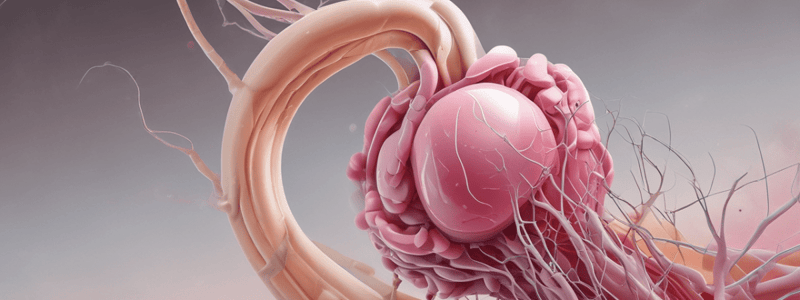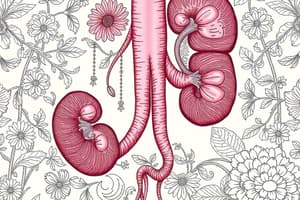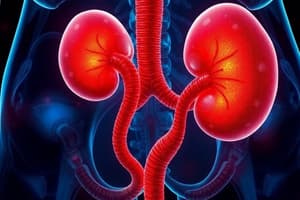Podcast
Questions and Answers
What is the primary cause of acute and chronic renal failure?
What is the primary cause of acute and chronic renal failure?
- Urinary tract obstruction (correct)
- Kidney stone
- Diabetes
- Urinary tract infection
What is the prevalence of urinary tract obstruction in elderly men?
What is the prevalence of urinary tract obstruction in elderly men?
- 20-35% (correct)
- 30-40%
- 40-50%
- 10-20%
Which of the following is NOT a normal point of narrowing in the urinary tract?
Which of the following is NOT a normal point of narrowing in the urinary tract?
- Renal artery (correct)
- Bladder neck
- Ureterovesical junction
- Ureteropelvic junction
What is a common cause of potential hydronephrosis and recurrent urinary infection in children?
What is a common cause of potential hydronephrosis and recurrent urinary infection in children?
What is the term for kidney injury caused by obstruction to the flow of urine?
What is the term for kidney injury caused by obstruction to the flow of urine?
What is the limitation of using Excretory Urography in patients?
What is the limitation of using Excretory Urography in patients?
What is the normal range for renal resistive index (RI) measured by Doppler in Renal US?
What is the normal range for renal resistive index (RI) measured by Doppler in Renal US?
What is the primary advantage of using CT over other imaging modalities?
What is the primary advantage of using CT over other imaging modalities?
What is the purpose of IV gadopentetate-DTPA in MRI?
What is the purpose of IV gadopentetate-DTPA in MRI?
What is the diagnosis if the Whitaker Test result is greater than 22 cm H2O?
What is the diagnosis if the Whitaker Test result is greater than 22 cm H2O?
What is a common cause of unilateral hydronephrosis that may remain silent and undetected?
What is a common cause of unilateral hydronephrosis that may remain silent and undetected?
What is a possible consequence of increased release of renin by the involved kidney in acute and subacute unilateral obstruction?
What is a possible consequence of increased release of renin by the involved kidney in acute and subacute unilateral obstruction?
What is a characteristic of retroperitoneal fibrosis?
What is a characteristic of retroperitoneal fibrosis?
What is a possible symptom of bladder outlet obstruction?
What is a possible symptom of bladder outlet obstruction?
What is a possible sign of dehydration and intravascular volume depletion in a patient with obstructive uropathy?
What is a possible sign of dehydration and intravascular volume depletion in a patient with obstructive uropathy?
Flashcards are hidden until you start studying
Study Notes
Urinary Tract Obstruction
- Restricted flow of urine from the kidneys through the urinary tract to the external urethral orifice.
- Common cause of acute and chronic renal failure.
- Potentially curable form of kidney disease.
Definition of Terms
- No data available in unselected populations.
- 20-35% prevalence in large survey among elderly men.
- 3.8% (adults); 2.0% (children) postmortem examinations.
- No gender difference until 20 years.
Age
- Women: 20-60 years.
- Men: >60 years.
- Special consideration in pediatric patients.
Etiology
- Mechanical blockade.
- Foundation defects.
- Normal points of narrowing include:
- Ureteropelvic junction.
- Ureterovesical junction.
- Bladder neck.
- Urethral meatus.
- Congenital malformations:
- Narrowing of the ureteropelvic junction.
- Anomalous (retrocaval) location of the ureter.
- Acquired defects:
- Pelvis tumor.
- Calculi.
- Urethral stricture.
- Infectious causes:
- Schistosoma haematobium.
- Genitourinary tuberculosis.
- Other causes:
- Obstructive uropathy.
- Extrinsic neoplastic.
- Inflammatory disorders.
- Retroperitoneal fibrosis.
Pathophysiology
- Unilateral (UUO) and bilateral (BUO) obstruction.
- Obstruction relieved or not.
- Time of obstruction.
Clinical Features
- Pain.
- Impaired excretory function.
- Bladder outlet obstruction.
- Bilateral renal pelvic or ureteric obstruction.
- Solitary functioning kidney.
- Hypertension.
Diagnosis
- Pain, renal colic.
- Inability to void effectively.
- Alteration in pattern of micturition.
- Recurrent UTI.
- New-onset or poorly controlled hypertension.
- Polycythemia.
- Recent gynecologic or abdominal surgery.
Physical Examination
- Signs of dehydration and intravascular volume depletion.
- Peripheral edema.
- Hypertension.
- Signs of congestive heart failure.
- Palpable kidney or bladder.
- Enlargement of pelvic organs.
- Examination of external urethra for phimosis, meatal stenosis.
Diagnostic Imaging
- Renal US:
- Safe in pregnant and pediatric patients.
- No need for IV contrast.
- May have false negative in acute obstruction (35%).
- Doppler measures renal resistive index (RI).
- Excretory Urography:
- Limited use in patients with renal insufficiency.
- Increased risk of contrast-induced nephropathy.
- Whitaker Test:
- Invasive.
- Discordant results limit clinical usefulness.
- Normal: <15 cm H20.
- Indeterminate: 15-22 cm H20.
- Obstruction: >22 cm H20.
- Nuclear Renography:
- Normal: T ½ < 10 min.
- Indeterminate: T ½ 10-20 min.
- Obstructed: T ½ > 20 min.
- CT:
- Most accurate study to diagnose ureteral calculi.
- More sensitive to identify cause of obstruction.
- Helpful in surgical planning.
- MRI:
- Can identify hydro but unable to identify calculi and ureteral anatomy of unobstructed systems.
- Diuretic MRU can demonstrate obstruction, especially accurate with strictures or congenital abnormalities.
- IV gadopentetate-DTPA allows functional assessment of collecting system while providing anatomic detail.
- GFR assessment.
- Renal clearance.
- Still several limitations in its use.
Studying That Suits You
Use AI to generate personalized quizzes and flashcards to suit your learning preferences.




